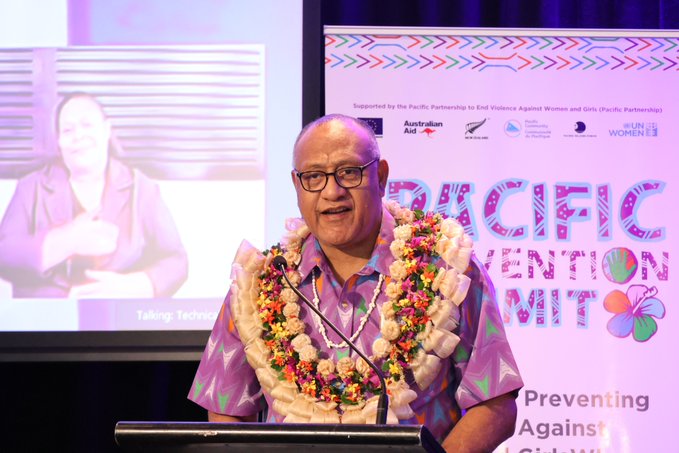“Addressing and preventing violence in all its forms against any individual – men, women, girls, boys, and communities is critical for development,” says Pacific Islands Forum, Deputy Secretary General, Dr Filimon Manoni.
Speaking at the Pacific Prevention Summit to end violence against women and girls, Dr Manoni said violence impedes all forms of development.
“It instills fear within communities, homes, schools, workplaces and in families, and particularly so for the most marginalised and vulnerable – our women in all their diversity, children, and persons with disabilities.
“Addressing and preventing violence requires a whole of government and community approach. It needs all of us to work together to stop violence from happening. This requires changing behaviour and social norms; working with women, religious and traditional leaders, and finding new ways to address the increasing rates of violence in our communities. This is particularly important as we navigate through the challenges brought on by advances in technology which can perpetuate, incite and amplify violence,” said Dr Manoni.
Dr Manoni said there is no place for violence in our region.
“It is important to recognise that to address and prevent violence we need to address the root causes. Key to this is ensuring and promoting gender equality. This is why gender equality, equity and social inclusion is a key priority under the 2050 Strategy for the Blue Pacific, if we are to achieve the Pacific Islands Forum Leaders vision for 2050 for a resilient Pacific region of peace, harmony, security, social inclusion and prosperity that ensures all Pacific peoples can lead free, healthy and productive lives.
“The Summit is important because it brings together government, civil, society, academia and practitioners for a tok stori at a time where it is critical to focus on preventing violence as we navigate through other regional priorities such as climate change and resilience, securing our maritime boundaries, improving education and health outcomes, capitalising on our trade capabilities and strategizing on regional economic development,” he said
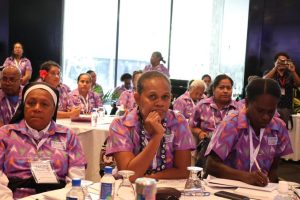
The Secretariat has completed consultations for the next iteration of the Pacific Leaders Gender Equality Declaration, and we look forward to the outcomes from this Summit as it will guide our thinking as we shape a revitalised Declaration that takes into account current context and will ensure that gender equality, equity and social priorities of the region are being reflected in the 2050 Strategy for the Blue Pacific Continent and other key work being progressed in the region including the Pacific Roadmap on Economic Development, Dr Manoni said.
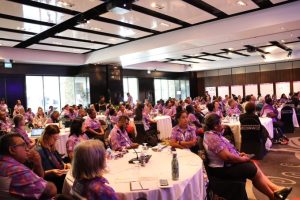
He encouraged delegates this week to be provocative, innovative and to think of new or strengthening current approaches to addressing and preventing gender-based violence including how we better engage men and boys in addressing gender inequality including preventing violence.
“It is not time for business as usual anymore. We cannot continue to be complacent.
“We need to accelerate actions to prevent violence from happening in the first place. The time is right now for us as a region and as a community to elevate our Pacific grown solutions to address this issue of gender-based violence if we are to achieve Pacific Islands Forum Leaders vision for our Blue Pacific Continent,” said Dr Manoni.
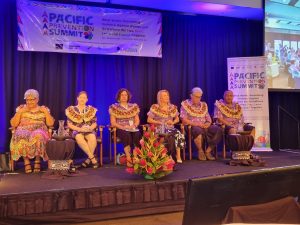 Addressing the meeting, Samoan Prime Minister Fiame Naomi Mata’afa said the current status of violence against women and girls in the Pacific is a concern for all of countries in the Blue Pacific.
Addressing the meeting, Samoan Prime Minister Fiame Naomi Mata’afa said the current status of violence against women and girls in the Pacific is a concern for all of countries in the Blue Pacific.
“The current global statistic is one in three but the Pacific is two in three, which makes the Pacific one of the regions with the highest levels of violence against women and girls in the world.
“Even my country Samoa has a statistic that tells us that 46 percent of the number of women surveyed had reported experience of physical or sexual violence, or both, by an intimate partner in their lifetime.
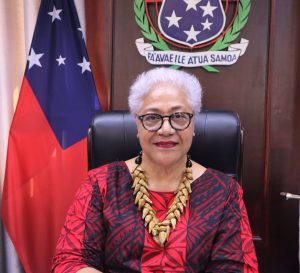 “I wish to underscore that Samoa has zero tolerance on violence against women and girls and that such practices are against our culture,” said PM Mata’afa.
“I wish to underscore that Samoa has zero tolerance on violence against women and girls and that such practices are against our culture,” said PM Mata’afa.
She said is important that both service provision and prevention efforts are maintained as they are considered imperatives to end violence against women and girls.
“In our experiences; survivors of violence against women and girls in the country have access to services through both the national health system and the non-government service providers. Led by the Ministry of Women, Community and Social Development, in partnership with many other agencies, the Inter-agency Essential Services Guide for Responding to Cases of Gender Based Violence and Child Protection was developed and launched. The IESG is a survivor-centred approach that aligns with the Samoan Government’s commitments under international conventions and complements national laws and policies.
“The Guide ensures that the support services are adaptable to support all women and children – from a survivor of intimate partner violence, to a child survivor of sexual assault.
“More needs to be done to support all survivors, in all their diversity and that we must continue to be committed to supporting them in their times of need.
“We must also highlight the importance of prevention,” she stressed.
PM Mata’afa said the provision of services alone is not going to solve the problem of violence against women and children – they need to go to the heart of the problem which is gender inequality.
“We need to identify and focus on the solutions that stop violence before it starts. Prevention efforts are crucial to change attitudes and in turn behaviour;
“Preventing violence is long-term work that requires commitment and persistent engagement;
“I stand together with other Pacific Island Leaders in calling for more concerted prevention efforts across the Pacific.
In Samoa, we have already started this at different levels. For example, among other key interventions, we are working in communities through a first of its kind Talanoa Toolkit for village-based advocates against family violence developed by the Office of the Ombudsman. These can be adapted and used in any community to enhance awareness on family violence prevention in districts, villages, churches, schools, and families. We are working mainly in schools, in faith-based organisations, in sports and in many other spaces in our society, she said.
She said Samoa is finalising its own National Prevention Framework on ending violence against women and girls.
“We have taken up the challenge nationwide to end violence against women and girls and recognise and advocate that it has no place in our society.
“In this connection I urge all Pacific Island leaders to make prevention of violence a priority. We need to stop the violence before it even starts, and we can achieve this if we work together, beginning from a common understanding of the root cause of violence, and common principles and values to steer our path.
“Stopping the violence before it starts is everyone’s responsibility,” said PM Mata’afa..
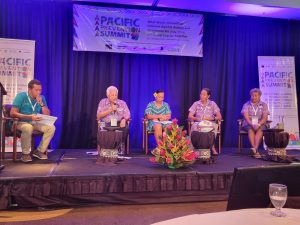 SOURCE: PACNEWS
SOURCE: PACNEWS






